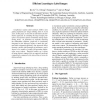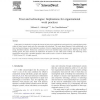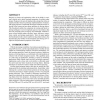686 search results - page 110 / 138 » Empirical Studies in Reverse Engineering |
CHI
1993
ACM
15 years 6 months ago
1993
ACM
A software tool called EXPLAINER has been developed for helping programmers perform new tasks by exploring previously worked-out examples. EXPLAINER is based on cognitive principl...
ICPR
2010
IEEE
15 years 5 months ago
2010
IEEE
Conditional random field methods (CRFs) have gained popularity for image labeling tasks in recent years. In this paper, we describe an alternative discriminative approach, by exte...
106
click to vote
DSS
2007
15 years 1 months ago
2007
In this paper, we empirically investigate the concept of trust across organizational work practices by examining three groups: within the team, between teams and when interacting ...
110
click to vote
PVLDB
2008
15 years 1 months ago
2008
Progress in science and engineering relies on the ability to measure, reliably and in detail, pertinent properties of artifacts under design. Progress in the area of database-inde...
144
click to vote
MSR
2011
ACM
14 years 4 months ago
2011
ACM
Modern software is often developed over many years with hundreds of thousands of commits. Commit metadata is a rich source of social characteristics, including the commit’s time...



